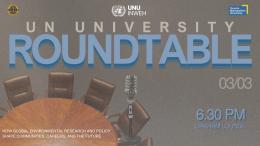On 17 March 2022, UNU-IAS co-organised a side event at the 2022 Geneva Meetings of the Convention on Biological Diversity (CBD) to discuss best practices and case studies of landscape management, aiming to incorporate landscape approaches into the Post-2020 Global Biodiversity Framework (GBF).
Marcel Kok (PBL Netherlands Environmental Assessment Agency) introduced the concept of landscape approaches and stressed the importance of promoting conservation at the landscape level, highlighting its benefits such as broadening the ecosystem approach and creating societal-transformative changes through a bottom-up and participatory manner. Mr Kok also presented the recommendations of a joint publication of UNU-IAS and PBL, Seizing the landscape opportunity in the GBF to catalyse transformative biodiversity governance.
Suneetha Subramanian (Research Fellow, UNU-IAS) outlined the linkages between landscape approaches, National Biodiversity Strategies and Action Plans (NBSAPs), the CBD mainstreaming strategy, and the CBD action agenda for the implementation of post-2020 targets. Dr Subramanian noted that the cross-cutting nature of landscape approaches could facilitate a synergistic implementation of multiple goals such as area-based conservation, restoration, and sustainable use.
During a panel discussion Mr Kok, Dr Subramanian, and Dr Bruno Leles (Partnerships Associate, UNU-IAS) discussed opportunities for restoring nature, the need for equitable landscape governance, and the application of landscape approaches in other global agendas such as the UN Decade on Ecosystem Restoration and the Paris Agreement on climate change. Parties including India, Malawi, Mexico, and Serbia discussed their experiences applying landscape approaches and provided insights to support further negotiations of the targets. NGOs and youth representatives raised issues related to equitable governance, representation of IPLCs and youth, and promotion of human rights in landscape planning and management. The discussion emphasised that the conservation of traditional knowledge and biocultural diversity — together with respect for land rights and the free, prior, and informed consent of indigenous peoples and local communities as promoted by the Satoyama Initiative — should inform the post-2020 targets. Speakers also called for the targets to include safeguard mechanisms for equity governance and human rights.
This side event of the Third Meeting of the Open-ended Working Group on the Post-2020 Global Biodiversity Framework (WG2020-3) was co-organised by PBL Netherlands Environmental Assessment Agency and the Ministry of the Environment, Government of Japan.

